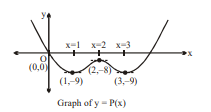Q.
Let $P(x)$ be a polynomial of degree 4 having a relative maximum at $x=2$ and $\underset{x \rightarrow 0}{\text{Lim}} \left(3-\frac{P(x)}{x}\right)=27$. Also $P (1)=-9$ and $P ^{\prime \prime}( x )$ has a local minimum at $x =2$.
The value of definite integral $\int_0^1(P(-x)-P(x)) d x$ equals
Application of Derivatives
Solution:
